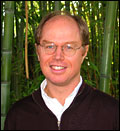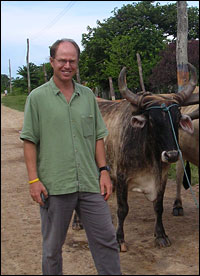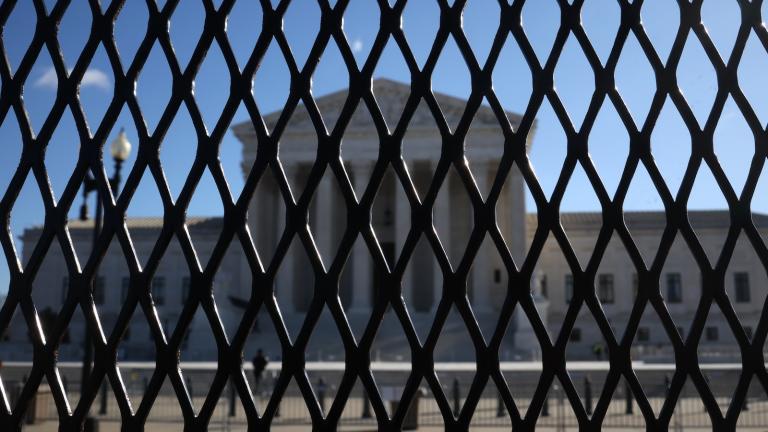
What work do you do?
I’m executive director of the Environmental Law Alliance Worldwide.
What does your organization do?
ELAW helps grassroots lawyers around the world protect human rights and the environment. We’re working with partners in 70 countries and helping them challenge environmental abuses, enforce environmental laws, give communities a voice about the environment, and chart a greener future.
What are you working on at the moment?
We’re helping partners in China enforce environmental laws, helping partners in Liberia challenge a polluting Firestone factory, helping partners in the Caribbean protect the Mesoamerican Reef, and helping partners in the Philippines combat air pollution. We’re also taking on climate damage. It’s a big planet, and we are keeping busy.
How do you get to work?
I walk my two daughters to school, then ride my bike.
What long and winding road led you to your current position?

Getting a hoof up on environmental law in Ixiamas, Bolivia.
Growing up in Oregon, I loved free-flowing rivers and thought damming them was wrong. When my mother asked, “What do you want to be when you grow up?” I answered: “A dam buster!”
Timber money ruled Oregon, and I learned early that we need to fight to protect the environment. I worked for U.S. Congress member Jim Weaver, a staunch environmental advocate. I learned that most people want to protect the environment, but those who want to exploit the environment have more money, more lobbyists, and more lawyers.
In an effort to level the playing field, I headed for Harvard Law School. I was president of the Environmental Law Society, graduated cum laude, then headed back West. I learned about a new organization that would work with lawyers in their home countries around the world to help them protect human rights and the environment. I became the first staff attorney at ELAW in 1991.
Where were you born? Where do you live now?
I was born and raised in Eugene, Ore., traveled east for school, worked in D.C. and Seattle, then settled back in Eugene. It’s a great place to raise a family.
What has been the worst moment in your professional life to date?
The people I work with around the world can pay a high price for challenging environmental abuses. Right now, a partner in Ethiopia is facing false charges that could bring the death penalty. When I hear about jailed partners, that makes a really bad day.
What’s been the best?
We recently helped children in Argentina get clean drinking water, helped protect ancient trees in Chile, helped fight off oil companies eyeing Costa Rica, helped a Malaysian community get relief from a polluting latex factory, and helped Liberia save its forests for future generations. These victories keep me going.
What environmental offense has infuriated you the most?
Hands down: President Bush rejecting the Kyoto Protocol.
Who is your environmental hero?
M.C. Mehta of India, a good friend and Goldman Prize winner. M.C. is a tremendous lawyer who has won sweeping victories for the environment and human rights.
What’s your environmental vice?
I own too many fly rods. But most of them were gifts!
How do you spend your free time?
Running rivers, camping, growing vegetables, fly-fishing, and helping my wife Hillary chase our two daughters.
Read any good books lately?
I just read The Last True Story I’ll Ever Tell: An Accidental Soldier’s Account of the War in Iraq, by John Crawford. It offers depressing insight into the disaster that is our war in Iraq.
What’s your favorite meal?
Organic vegetables from my garden with a fried egg from our family chicken, Mary.
Which stereotype about environmentalists most fits you?
I enjoy reading Grist!
What’s your favorite place or ecosystem?
Rivers of the western slope of the Cascades.
If you could institute by fiat one environmental reform, what would it be?
A carbon tax, with the money used to find sustainable energy solutions.
Who was your favorite musical artist when you were 18? How about now?
Jerry Jeff Walker when I was 18. Greg Brown now.
What’s your favorite TV show? Movie?
I don’t watch much TV, except for the Tour de France. My favorite movie is The Adventures of Buckaroo Banzai Across the 8th Dimension.
Which actor would play you in the story of your life?
If you could have every InterActivist reader do one thing, what would it be?
Visit our website to learn more about how you can help ELAW empower grassroots advocates in their home countries to build healthy communities and protect the planet.

Bern Johnson, Environmental Law Alliance Worldwide.
Johnson in Law
What can be done to prevent the polluting of poor countries by richer ones, such as the recent toxic scandal in Ivory Coast? — Juliette Hauville, Bologna, Italy
The key is to empower people to protect themselves and their environment. ELAW gives partners in less-industrialized countries the legal and scientific tools they need to challenge polluters. When would-be polluters know that skilled, committed lawyers — armed with the best legal and scientific tools — are ready to hold them accountable in every country around the world, they will be less likely to export environmental abuses.
If your firm was given a million dollars to support your activism, what work would you support where you could have the biggest long-term impact? Is it within your organization’s capacity to actively promote a national carbon tax? — Scott Pope, Eugene, Ore.
With a million dollars, I would focus on three major initiatives:
I would help lawyers around the world protect the global climate through law. The damage we are doing to our climate threatens to be one of the worst injustices of all time — the people least responsible for damaging our climate will be the ones most harmed by the consequences. We should be engaging legal systems to prevent and remedy this injustice.
I would support ELAW’s Rapid Response Network. Lawyers all over the world call on us for help in challenging environmental abuses. Often, these lawyers are racing to protect communities or ecosystems. We need to respond instantly to give these lawyers the legal and scientific tools they need to win.
I would give communities a voice in decisions about the environment. Communities all over the world want to build a sustainable future. We want to work with our partners to ensure that disadvantaged communities have the right to participate in decisions about the environment and that their voices are heard.
Our work is focused outside the U.S., so we would not be working to promote a national carbon tax in the U.S. We are, however, looking at policy tools that our partners around the world can use to help protect the global climate.
Who foots the bill for the resource your organization provides? — Marie Fisher, Telford, Pa.
ELAW helps partners around the world at no charge. We support our work with gifts from individuals, foundation grants, and occasional government grants. Because we use electronic communication tools to empower local partners with the legal and scientific resources they need, we achieve big bang for the buck. I appreciate your question and would be thrilled to have your support!
Do you have any words of advice for aspiring environmental lawyers like me? Anything you wish you had done differently in law school or shortly thereafter? — Michael Kopp, Denver, Colo.
I’m glad to hear you are an aspiring environmental lawyer. My first advice is simple: Find ways to work to protect the environment through law. We need more lawyers working to protect the environment.
While you are in school, find ways to work with practicing environmental lawyers. Whether you earn credit toward your degree, volunteer, or even get paid, you will learn a lot. Remember that many people who call themselves “environmental lawyers” are not actually working to protect the environment. In fact, some of them are helping corporations find ways to avoid complying with environmental laws.
Live simply and save money. My first job out of law school was working in a private firm that paid me pretty well. I was able to pay off my student loans and save some money, so in a few years I could afford to take a big pay cut to go to work for a nonprofit and work full time to protect the environment. Saving money can open the door to working for the planet.
When I was looking into law schools, I was told that you don’t study environmental law. Instead, you get the law coursework and hope to find an environmental firm to get the specific experience upon graduating. Is this the reality, and what was your undergrad major? — Jared Webb, Rocky Mount, Va.
I studied political economy at Williams College, which enabled me to learn about how political systems make decisions about natural resources. I cannot imagine a law school that does not offer courses in environmental law. In your first year of law school, you generally take the prescribed mainstream courses, but you should be able to take plenty of environmental law courses during your second and third years of law school.
I suspect that you will learn the most about protecting the environment through law by working with lawyers who are doing that work. When you are looking at law schools, find out if they offer clinical opportunities to work with environmental defenders — internships, externships, etc. — and then pursue whatever is available while you’re in school. You should be able to earn credit for working to protect the environment.
How has technology impacted your ability to do your work internationally? — Dean Ericksen, Seattle, Wash.
Communications technology makes it possible for ELAW to give a grassroots lawyer in the farthest corners of the globe the latest scientific research about environmental problems and solutions. We can connect grassroots lawyers with the best environmental law minds in 60 countries around the globe. We can hold multinational corporations accountable for environmental abuses on the other side of the globe. We can share news of environmental victories and work to replicate them around the world. We can empower grassroots organizations to collaborate with partners all over the world in ways that were impossible a few years ago, and unthinkable 30 years ago.
I am a big believer in the power of communications technology to advance progressive causes. Most progressive causes — including protecting the environment — are hindered by a lack of organization and a lack of resources. If they are used wisely, electronic communication tools can help overcome these hurdles.
When people come at you with the argument that global warming doesn’t exist, what do you use to counter them? Also, what can we do to make the government respond to global warming? — Taylor Sorensen, Seattle, Wash.
It is difficult to convince people who refuse to recognize science. I agree with British Energy Minister Malcolm Wicks, who told Reuters: “The people in denial now are the equivalent of the Flat Earth Society.” We need to educate and motivate reasonable, informed people, and ignore those who refuse to recognize science.
As far as moving the government, for now, I would focus on state and local governments. Write to your governor and mayor and ask what steps they have taken to protect the global climate; then urge them to do more.
What will most Americans be using for transportation 25 years from now? On a three-day fishing trip would you rather act as fishing guide for Rush Limbaugh or Bill O’Reilly? — Tommy Bascom, Eugene, Ore.
In 25 years, we had better be using some form of transportation that is lighter on the earth than what we use now.
I’m no fishing guide, and I would only want to go on a fishing trip with someone who truly appreciated the fish and the healthy river they need.
How can U.S. law students obtain legal internships from the partners listed on ELAW? — Elena Gil, San Francisco, Calif.
U.S. law students have worked with many of the organizations in the ELAW network. If you are interested, write to us, let us know where you might be interested in working, and we’ll see what we can do. Keep in mind that our partners generally cannot pay legal interns.
I am an environmental attorney who wants to work on bigger issues. Can you give me a job? — Dan Gildor, Austin, Texas
Thanks for asking. Right now, we are not looking to hire any attorneys. If we can find some more money, I would like to hire more lawyers and scientists to do more good for the planet.
During my regular dog-walk loop, I sometimes encounter strong-smelling fumes coming from a freestanding car workshop in a neighborhood yard. Aren’t there any regulations on chemicals we release into the environment? Who are the environmental police that should be notified? — Naomi Klass, Falls Church, Va.
The U.S. EPA issued a regulation [PDF] not too long ago that limits organic hazardous air pollutants from shops that engage in surface coating of automobiles and light-duty trucks.
You could call the air toxics office to learn who should be notified about a potential violation of this regulation in your area.
You are lucky that your family is supportive of your environmental values. Any advice for those of us who live with people who cannot be convinced that they should at least religiously recycle, reduce, and reuse? — Elena Gil, San Francisco, Calif.
Yes, I am lucky to live with a family that shares my commitment to protecting the environment. If you are not so fortunate, I would recommend identifying simple steps that people close to you can take to reduce their impact on the planet. If you identify those steps and show that they will benefit the planet without reducing anyone’s quality of life, you should be able to start moving people in the right direction.
What suggestions would you give to phase out concentrated animal-feeding operations that pose a huge threat to our ground and surface water? — Ginny Botz-Taylor, Tempe, Ariz.
In 2003, the U.S. EPA finalized effluent limitations for CAFOs.
Waterkeeper Alliance, a nonprofit environmental organization, sued the EPA because the rule was too lax. You may want to contact Waterkeeper Alliance to get involved with their efforts.
I’ve heard you’re coping with the loss of two particularly amazing high-school volunteers. How are you dealing with this? More importantly, how are the office appliances dealing with this epic tragedy? — Kate Fickas and Rebekkah Meyer, Eugene, Ore.
I love working with volunteers. They bring energy, enthusiasm, and new ideas. We had two wacky high-school student volunteers who named all of our office equipment. We think of those crazy kids every time we turn on Archibald, the postage meter. Volunteers help us protect the planet, and we help them gain skills and experience.
You see so much suffering around the world, and yet you maintain such a positive attitude. How do you do it? — Ashley Henry, Portland, Ore.
I am lucky to have a strong, supportive family. I am inspired by partners around the world who work against overwhelming odds to protect the planet. Children — especially my two daughters — make me laugh, and laughing always helps. Going outside and enjoying nature always lifts me up. Wild rivers, big mountains, and huge trees work great, but even a small weed struggling to grow through a crack in the concrete can lift me.
I keep an Edward Abbey quote by my desk: “One final paragraph of advice: do not burn yourselves out. Be as I am — a reluctant enthusiast … a part-time crusader, a half-hearted fanatic. Save the other half of yourselves and your lives for pleasure and adventure. It is not enough to fight for the land; it is even more important to enjoy it. While you can. While it’s still here. So get out there and hunt and fish and mess around with your friends, ramble out yonder and explore the forests, climb the mountains, bag the peaks, run the rivers, breathe deep of that yet sweet and lucid air, sit quietly for a while and contemplate the precious stillness, the lovely, mysterious, and awesome space. Enjoy yourselves, keep your brain in your head and your head firmly attached to the body, the body active and alive, and I promise you this much; I promise you this one sweet victory over our enemies, over those desk-bound men and women with their hearts in a safe deposit box, and their eyes hypnotized by desk calculators. I promise you this; you will outlive the bastards.”


